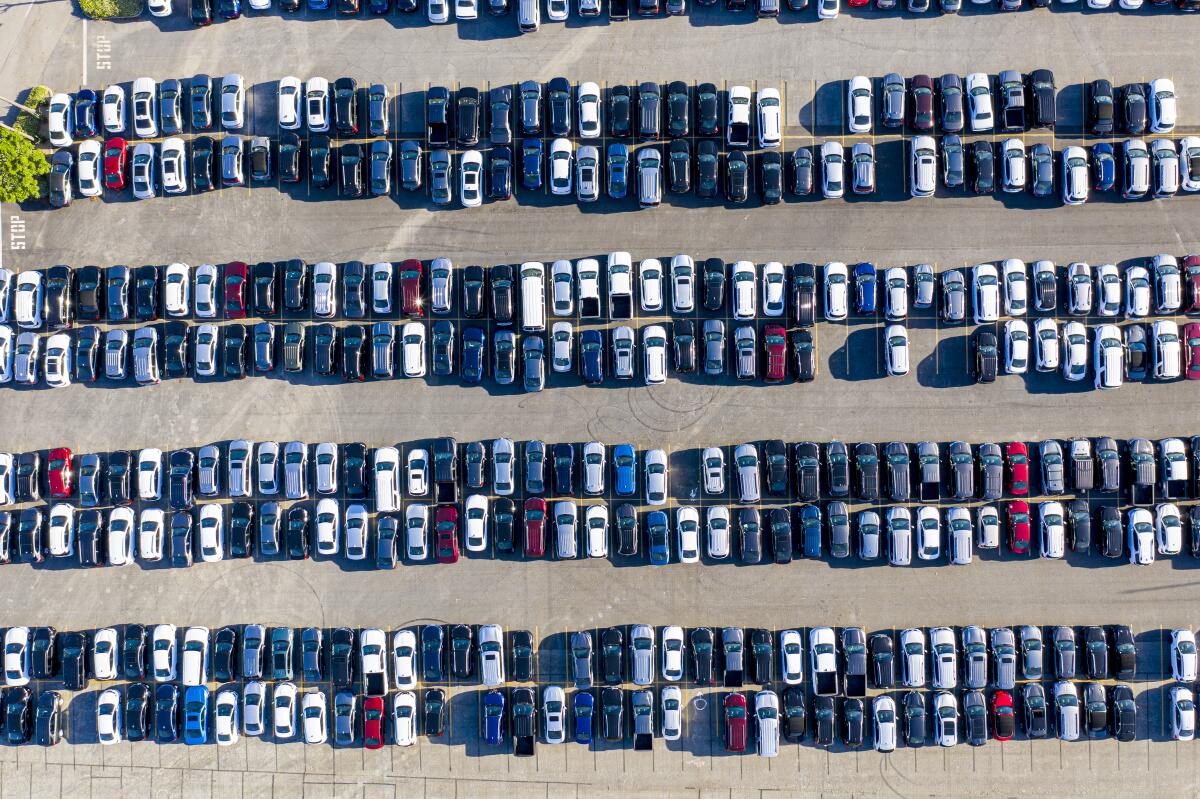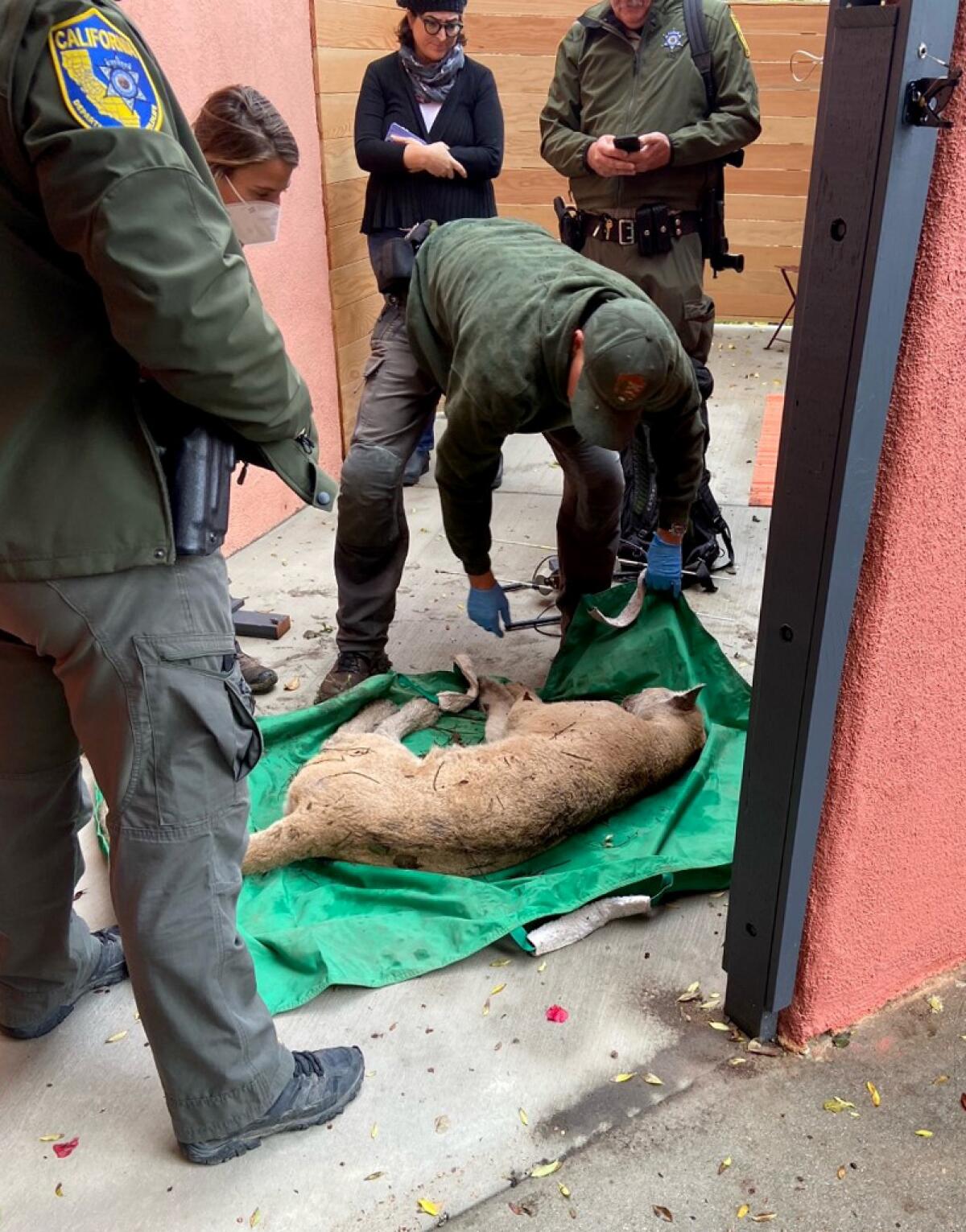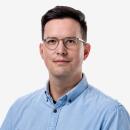Should we build fewer parking spaces? Californians weigh in

- Share via
Good morning, and welcome to the Essential California newsletter. It’s Tuesday, Dec. 13. I’m Ryan Fonseca.
Last week I brought you a perspective from parking prophet Donald Shoup, a professor of urban planning at UCLA. Shoup has spent decades studying the effects parking has on cities.
One focal point in his research is mandates that require developers to construct a certain amount of off-street parking spaces per unit of housing. These drive up construction costs (the U.S. average cost per space is over $24,700) and have been tied to higher rents.
Shoup’s basic conclusion: Dedicating so much space to parking makes housing more expensive, traffic more congested and air pollution worse.
The “simplest and easiest solution in California,” according to Shoup:
Take the all the city’s parking requirements and change the word from “minimum” to “maximum.”
The effort to rethink parking requirements is just one part of a multilayered movement in many cities to redesign public space and reduce our dependence on cars (and the congestion, traffic violence and harmful emissions that come with it).
As California and some of its cities relax or eliminate some parking minimums, I asked you to share your parking perspectives.
Your thoughts on changing parking minimums ranged from the adamant “yes!” to “hell no” to “mixed feelings.” Here’s a compact-sized sampling of what readers had to say about parking and living a car-free or -reduced life (some responses were lightly edited for clarity and brevity).
“I do support elimination or reduction of parking minimums in new developments because I live in a walkable area of San Diego with public transit. Yet new apartments are being built here with large parking garages and very few new buildings without parking allotted. This makes no sense. Sometimes I feel that we are subjected to automobile tyranny and the unsafe streets and pollution it creates.”
— Richard Barry, San Diego
“I would love to live in a car free world, but I worry that the disinvestment in parking is not correlated with a higher investment in improving transit. Without the latter, you’re just making people’s lives harder and not providing the alternative that will stop the grumbling about parking.”
— Alexandra Tangalos, Los Angeles
“On the plus side, getting folks to use public transportation seems a good idea for the often stated reasons. On the negative side, the inconvenience of using public transportation in many areas of the state makes the one-size-fits-all law seem unwise.”
— Bruce Frohman, Modesto
“Broad-brushed approaches do not address particular situations. If there is a lack of parking, then drivers will park in the residential neighborhoods and block bike lanes and double park. [These plans] are difficult to achieve in our capitalistic economy and privacy preferring society. The result is likely to be that cities go from having excess parking to experiencing adverse impacts from not having enough or not having it in the right places... meanwhile developers of new projects profit at the public’s expense.”
— Rick Hyman, Santa Cruz
“Driving has become a problem and parking can determine if the trip is worth taking. Anything that can be done to get people out of their cars is a win —but that’s the challenge...the 15-Minute City is a great start.”
— William Van Iden, Mill Valley
“I believe the decisions to do away with parking [minimums] are not practical. So long as people have to commute to work, medical appointments, travel, or shopping there will be a need for a car. Convenience and saving time are paramount today.”
— David Yamada, Pasadena
“Implementing ways to lessen dependence on cars will enhance further development of public transit — we hope. I want an affordable, walkable neighborhood and would happily relocate there ASAP. Living in a car-dependent suburb (as beautiful as it is) has lost its charm.”
— Susan Josephed, Rancho Palos Verdes
“Forcing people to use mass transit by reducing parking spaces is the same deranged mentality as forcing people to buy EVs by blocking the sale of gas vehicles. California is going down a dangerous path that will ultimately cause harm and financial hardships for the people of this state.”
— Gary Ault, Redding
“It’s not cheaper when the bigger economic infrastructure is considered. This is a short-sighted idealistic experiment that the market will reject. It also discriminates against people who cannot walk distances or ride bicycles.”
— Brent Johnson, Carlsbad
“While I understand the problems with parking minimums, I have questions about how reducing parking spaces will impact disabled people. I have not seen any discussion about this, and I have serious concerns given the lack of good sidewalks and reliable, accessible transportation in many places. Will there still be accessible parking spaces near these new developments?”
— Christine Wieseler, Orange
“The ability (really need) to ‘drive everywhere’ is not independence — it’s dependence. People should have more transportation options; driving, walking, biking or taking mass transit should all be viable alternatives.”
— Mark Keppler, Clovis
“I wholeheartedly support it. As an environmentalist and active transportation planner, this is the kind of thing I’m fighting for in my career. Transportation makes up the largest component of greenhouse gas emissions, of which about 75% are from private cars. We have to restructure our society to make cars less of a main character in our transportation landscape, and limiting parking requirements is an essential step.”
— Elizabeth Greenfield, Los Angeles
Thank you to everyone who took some time out of their day to share their thoughts. I hope you’ll keep them coming as we pose more questions to you about life in the Golden State.
And now, here’s what’s happening across California:
Note: Some of the sites we link to may limit the number of stories you can access without subscribing.
L.A. STORIES
Here’s a strong contender for most distinct greeting: “You have a lion in your backyard.” P-22, L.A.’s wildest celebrity, has been captured days after wildlife officials announced plans to catch and evaluate him. California Department of Fish and Wildlife officials found the big cat in the backyard of a Los Feliz home after they received a tip he’d been hit by a driver. Officials did not confirm if the puma was in fact struck, only saying that he is “in stable condition.” Los Angeles Times

Check out "The Times" podcast for essential news and more
These days, waking up to current events can be, well, daunting. If you’re seeking a more balanced news diet, “The Times” podcast is for you. Gustavo Arellano, along with a diverse set of reporters from the award-winning L.A. Times newsroom, delivers the most interesting stories from the Los Angeles Times every Monday, Wednesday and Friday. Listen and subscribe wherever you get your podcasts.
POLITICS AND GOVERNMENT
On her first day on the job, L.A. Mayor Karen Bass declared a state of emergency to address the city’s homelessness crisis. The act, which needs the approval of the City Council, would give her the power to speed up the process of adding more temporary housing for unhoused Angelenos. “We must bring people indoors faster, and we will,” Bass said. Los Angeles Times
Want a new park? In San Diego, that and other improvements will soon depend on a complex neighborhood scoring system. City leaders voted Monday to adopt the new policy, which is designed to prioritize infrastructure funding in historically underserved communities. San Diego Union-Tribune
Support our journalism
HEALTH AND THE ENVIRONMENT
L.A. is working on a plan to tap into a local water supply: the contaminated San Fernando Valley groundwater basin. A trio of treatment facilities is expected to filter the groundwater, which became toxic thanks to waste disposed by aerospace, automobile and other companies. If the $600-million plan works out, the long-unused aquifer could contribute about a fifth of the water Angelenos use each year. Los Angeles Times
Will red states follow California’s lead to forge a greener path forward? That depends on if conservatives can get past their contempt for the Golden State. As Times reporter Noah Bierman writes, environmentalists recognize “they can’t complete the shift if electric cars are viewed as something only for rich liberals in California and New York. They need everyone.” Los Angeles Times
CALIFORNIA CULTURE
“Make some noise for the richest man in the world,” comedian Dave Chappelle told his San Francisco audience Sunday night. And they did make some noise, loudly booing billionaire Elon Musk when he joined Chappelle on stage at the Chase Center. Musk addressed the incident on Twitter and downplayed his negative reception — though he added: “that’s a lot of boos, which is a first for me in real life.” The Verge
Free online games
Get our free daily crossword puzzle, sudoku, word search and arcade games in our new game center at latimes.com/games.
CALIFORNIA ALMANAC
Los Angeles: sunny, 57. San Diego: mostly sunny, 58. San Francisco: patchy fog then sunny, 54. San Jose: frost and patch fog then sunny, 54. Fresno: decreasing clouds, 51. Sacramento: frost and freezing fog then sunny, 5o.
AND FINALLY
Today’s California memory is from Francesca De Stefano:
East Coast transplants, we were settling into San Francisco lives—finding apartments, searching out jobs. But we hadn’t been drawn 3,000 miles to live the same stories in a different place. We’d left behind families, colleges, first jobs, friends. The California sun was so stark, so much brighter than the East Coast amber we knew, everything looked a little surreal. It all felt like our secret: walking through the hole in a towering rock formation to find Hole-in-the-Wall Beach, getting our first glimpses of Tahoe through the trees. Somebody dubbed our lives “The California Movie” and it stuck.
If you have a memory or story about the Golden State, share it with us. (Please keep your story to 100 words.)
Please let us know what we can do to make this newsletter more useful to you. Send comments to essentialcalifornia@latimes.com.
Hey there, subscribers — our marketing team wants to hear from you. Fill out this short survey to help us keep sharing the stories that shape your world, free to your inbox.
Sign up for Essential California
The most important California stories and recommendations in your inbox every morning.
You may occasionally receive promotional content from the Los Angeles Times.







